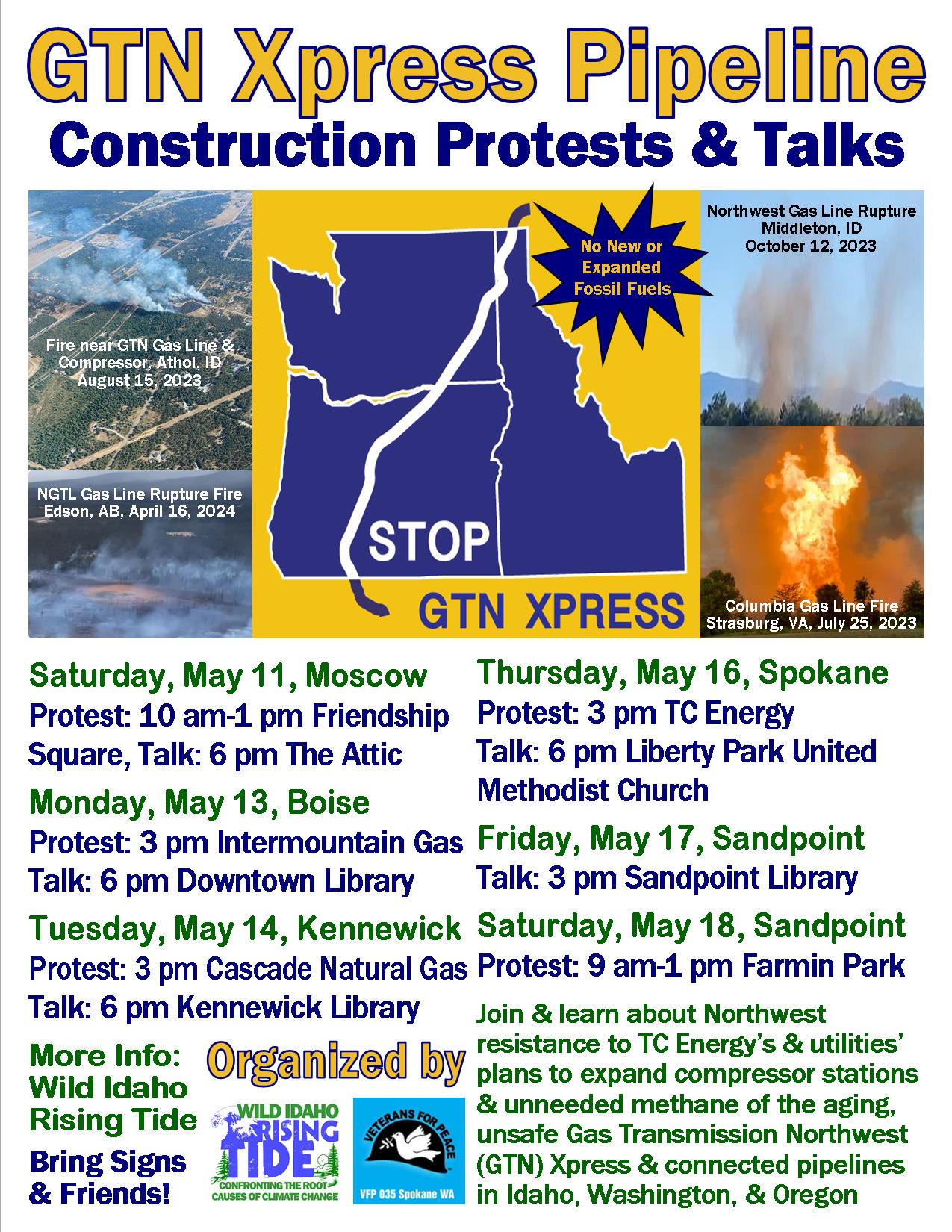
Regional, volunteer, climate activists collective Wild Idaho Rising Tide (WIRT), Veterans for Peace Spokane Chapter 35, and allied organizations invite the inland Northwest and especially Idaho community to again respond with public, forceful concern to the climate-wrecking, federally enforced, fossil fuel industry threat of the Gas Transmission Northwest (GTN) Xpress fracked methane gas pipeline expansion. In Boise, Moscow, and Sandpoint, Idaho, and Kennewick and Spokane, Washington, in mid-May, we propose another week of not only demonstrations, similar to two previous endeavors, but also local presentations offered to describe two-plus years of ongoing, Northwest resistance to GTN Xpress and to consider direct actions against impending construction of compressor stations [1-3].
So many destructive fossil fuels and highway expansion projects have received permits or concluded construction during this last year, such as the Highway 95 reroute on Paradise Ridge near Moscow, the Coastal GasLink pipeline through unceded, Wet’suwet’en, indigenous territory in British Columbia, the Trans Mountain tar sands pipeline expansion across western Canada, and now GTN Xpress. Despite the annual, privileged polluter panaceas of Earth Day, this increasingly unbreathable, unlivable planet needs all “hands on deck” and “boots on the ground” to stop the climate hell imposed by our industrialized life ways.
Please join with us and learn about the growing campaign to prevent plans by TC Energy, GTN, Cascade Natural Gas, Intermountain Gas, and other utilities, to push unneeded methane through aging, unsafe, GTN infrastructure and connected pipelines across Idaho, Washington, and Oregon. We gratefully welcome your participation, strategy ideas, and responses in-person and/or via phone, text, or email, as we coordinate these upcoming events and provide a slide show, banner, and T-shirts. Organizers also ask that you print, post, and share this announcement and flyer and bring protest signs, friends, and family to these public gatherings and discussions.
Saturday, May 11, Moscow, Idaho
Protest & Outreach: 10 am to 1 pm Moscow Farmers Market, Friendship Square, 400 S. Main Street
Talk: 6 to 8 pm The Attic, 314 E. Second Street (rear stairs)
Monday, May 13, Boise, Idaho
Protest: 3 to 5 pm Intermountain Gas, 555 S. Cole Road
Talk: 6 to 8 pm Boise Downtown Public Library, William Hayes Memorial Auditorium (first floor), 715 S. Capitol Boulevard
Tuesday, May 14, Kennewick, Washington
Protest: 3 to 5 pm Cascade Natural Gas, 8113 W. Grandridge Boulevard
Talk: 6 to 8 pm Mid-Columbia Library, conference room (first door on right), 1620 S. Union Street
Thursday, May 16, Spokane, Washington
Protest: 3 to 5 pm TC Energy, 201 W. North River Drive, Suite 505
Talk: 6 to 8 pm Liberty Park United Methodist Church, social hall, 1526 E. 11th Avenue
Friday, May 17, Sandpoint, Idaho
Talk: 3 to 5 pm East Bonner County Library, Community Room B, 1407 Cedar Street
Saturday, May 18, Sandpoint, Idaho
Protest & Outreach: 9 am to 1 pm Farmers’ Market at Sandpoint, Farmin Park, 301 Oak Street
Issue Updates
On the morning of April 16, 2024, Gas Transmission Northwest (GTN), a subsidiary of Keystone and Keystone XL tar sands pipelines owner TC Energy (formerly TransCanada), filed a request with the Federal Energy Regulatory Commission (FERC), for a prompt decision allowing construction to proceed at three Northwest compressor stations, to increase the gas capacity of the GTN Xpress fracked methane pipeline, FERC docket CP22-2 [4]. Also on April 16, in another probably industry-ghostwritten comment to FERC, Idaho Congressional members urged the commission to approve construction of this Canadian fossil fuels invasion “bringing more supply to the communities that the pipeline safely serves” [5]. Continue reading


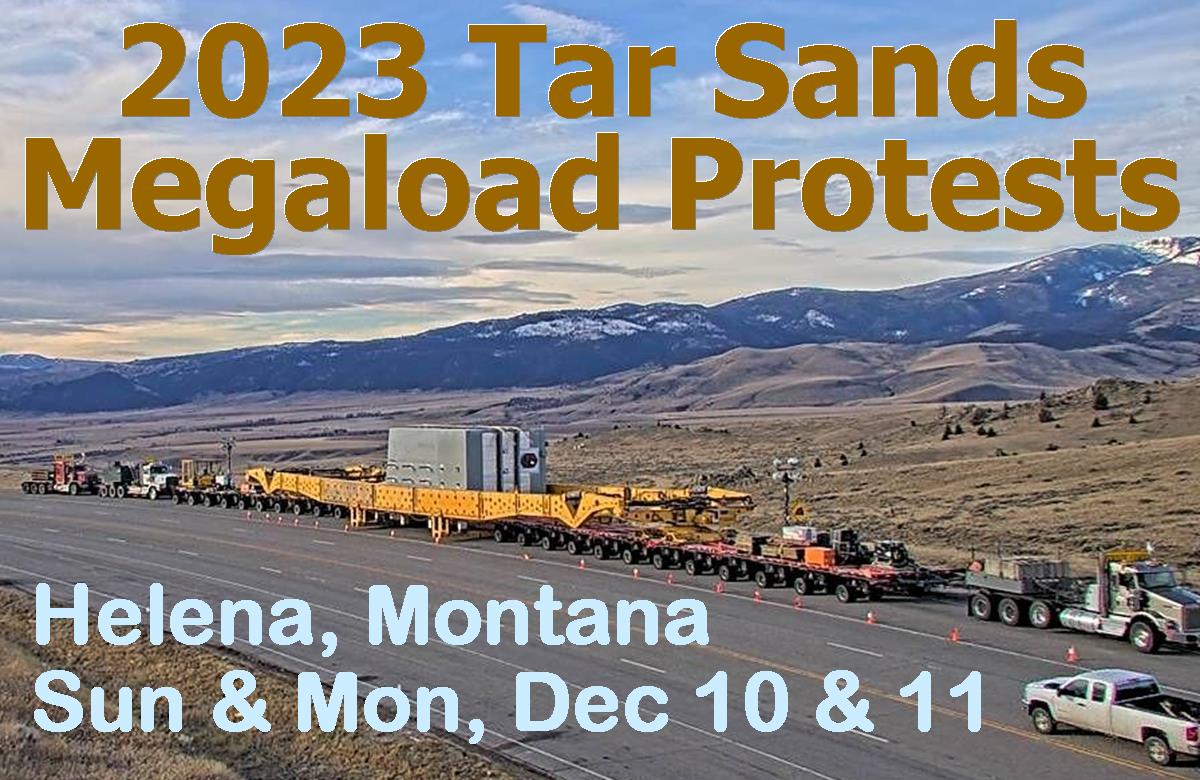 Megaload Information
Megaload Information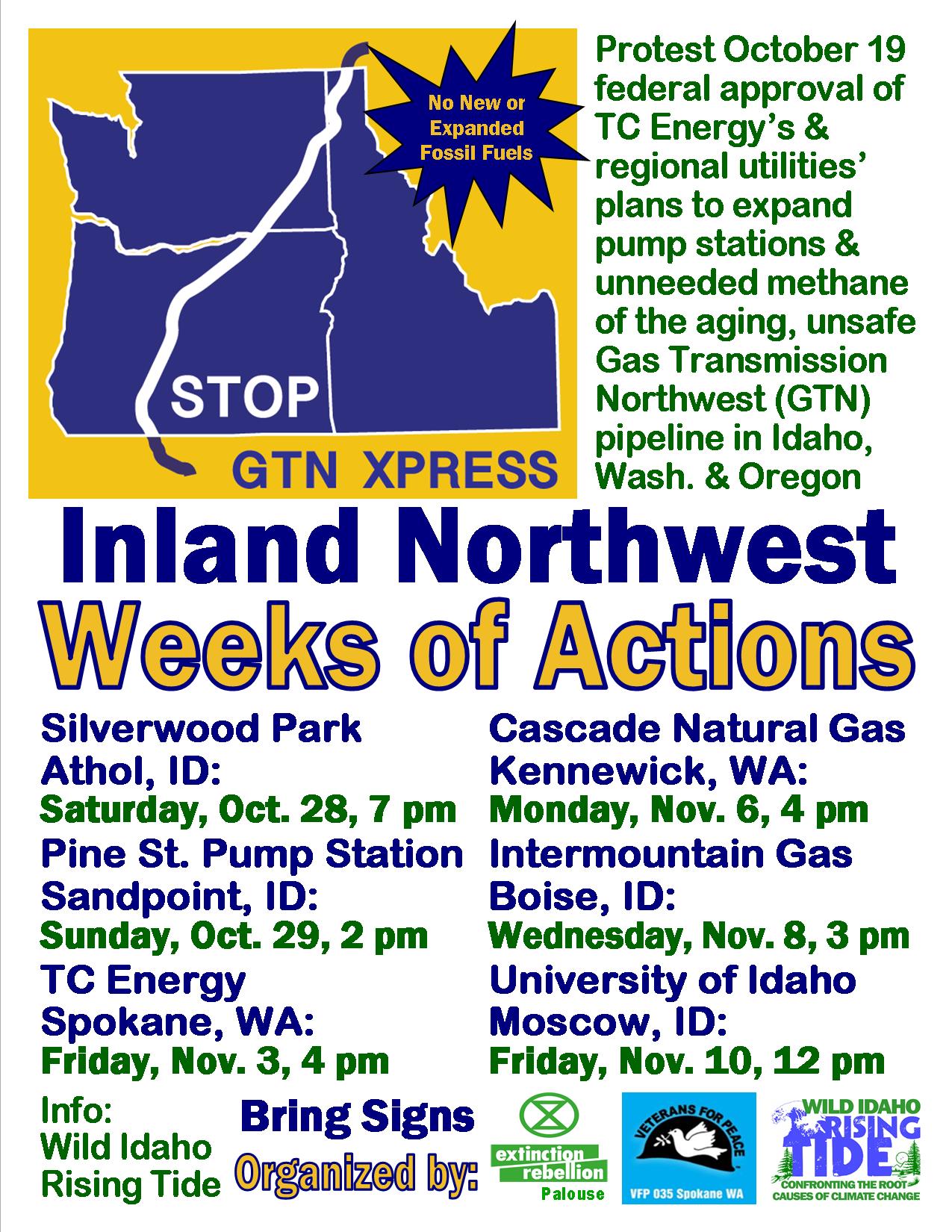 On October 19, the Federal Energy Regulatory Commission (FERC) approved the Gas Transmission Northwest (GTN) Xpress expansion of an unsafe, potentially explosive, six-decade-plus, methane (“natural” gas) pipeline across Idaho, Washington, and Oregon to California [1-7]. The Calgary, Alberta-based, Canadian owner of the rejected Keystone XL and rupture-prone Keystone tar sands pipelines in the Great Plains and the fiery Columbia Gas Transmission line in the northeast U.S., TC Energy (formerly TransCanada) proposes to increase the pump pressures of three compressor stations in Athol, Idaho, Starbuck, Washington, and Kent, Oregon, and push an additional 150 million cubic feet per day of unneeded, fracked gas volumes through the almost 1,400-mile-long GTN line from Eastport, Idaho, to Malin, Oregon, suspiciously the origin point of the defeated Pacific Connector gas pipeline to the also vanquished Jordan Cove liquefied natural gas (LNG) export terminal planned for Coos Bay, Oregon [8, 9].
On October 19, the Federal Energy Regulatory Commission (FERC) approved the Gas Transmission Northwest (GTN) Xpress expansion of an unsafe, potentially explosive, six-decade-plus, methane (“natural” gas) pipeline across Idaho, Washington, and Oregon to California [1-7]. The Calgary, Alberta-based, Canadian owner of the rejected Keystone XL and rupture-prone Keystone tar sands pipelines in the Great Plains and the fiery Columbia Gas Transmission line in the northeast U.S., TC Energy (formerly TransCanada) proposes to increase the pump pressures of three compressor stations in Athol, Idaho, Starbuck, Washington, and Kent, Oregon, and push an additional 150 million cubic feet per day of unneeded, fracked gas volumes through the almost 1,400-mile-long GTN line from Eastport, Idaho, to Malin, Oregon, suspiciously the origin point of the defeated Pacific Connector gas pipeline to the also vanquished Jordan Cove liquefied natural gas (LNG) export terminal planned for Coos Bay, Oregon [8, 9].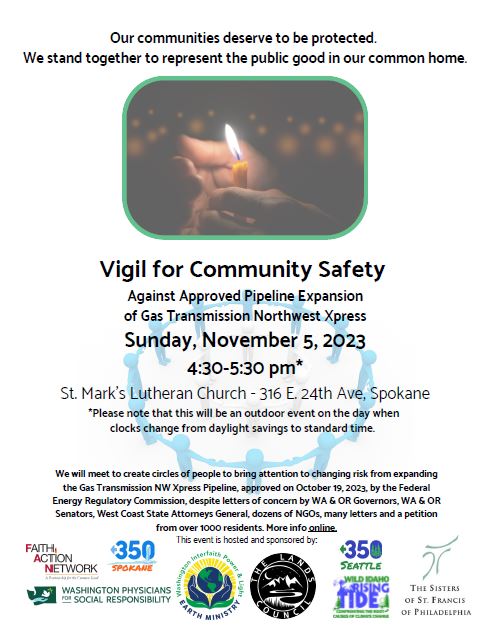
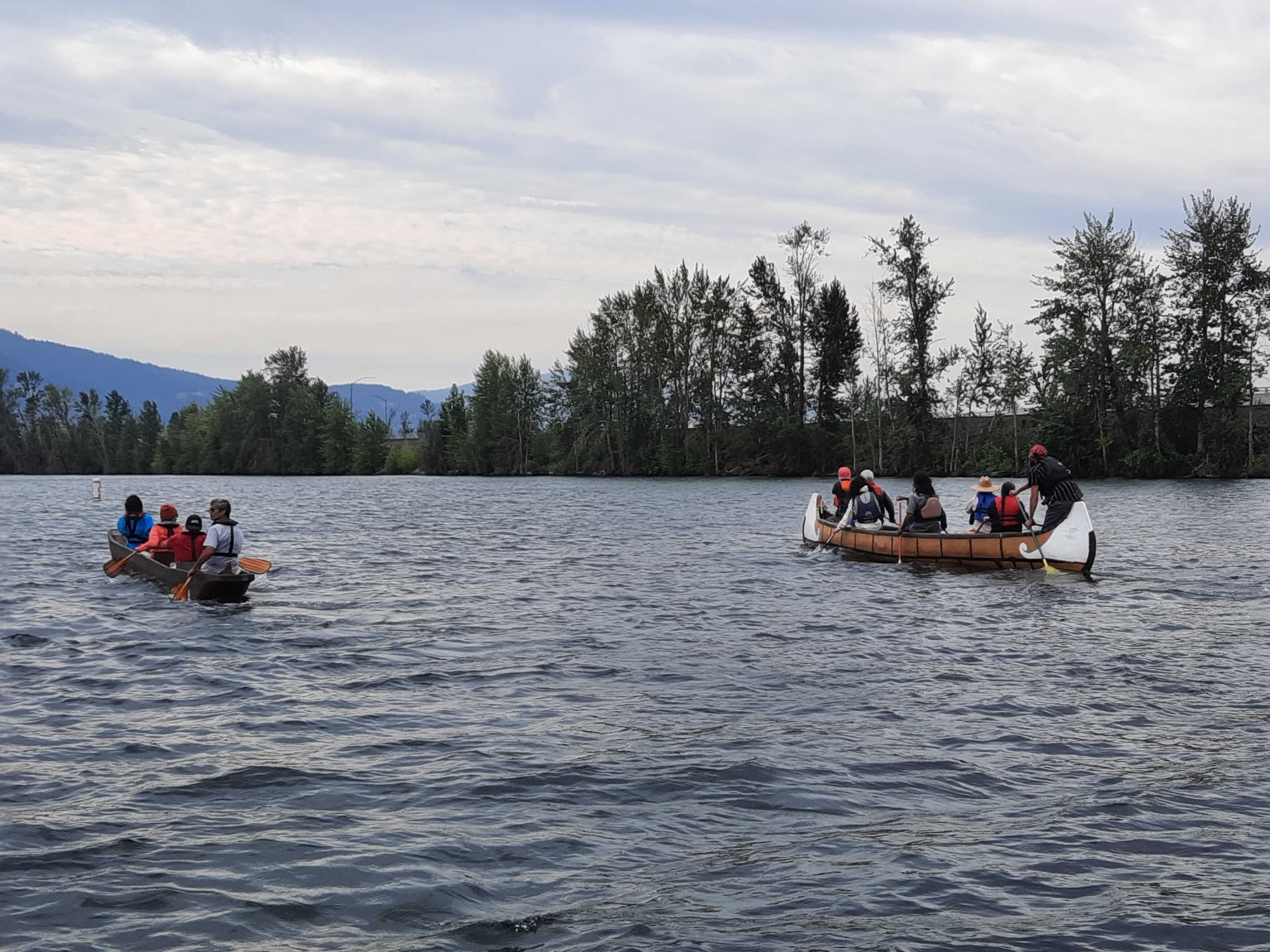 On Monday, July 31, through Friday, August 4, Kalispel and regional tribal members and the River Warrior Society are holding the annual Remember the Water Kalispel Powwow canoe journey [1, 2]. The paddle usually voyages from Lake Pend Oreille and Qpqpe (Sandpoint), Idaho, to the Qlispe (Kalispel) Village in Cusick, Washington, during the week before the yearly Kalispel Powwow and around the time of the Festival at Sandpoint music concerts. In this cultural journey, families and friends are again paddling in traditional, dugout, wooden and sturgeon nose canoes, like their ancestors did for travel, fishing, and fun, over 50 miles through their home lands and waters among the tributaries, lake, and river of the Pend Oreille watershed.
On Monday, July 31, through Friday, August 4, Kalispel and regional tribal members and the River Warrior Society are holding the annual Remember the Water Kalispel Powwow canoe journey [1, 2]. The paddle usually voyages from Lake Pend Oreille and Qpqpe (Sandpoint), Idaho, to the Qlispe (Kalispel) Village in Cusick, Washington, during the week before the yearly Kalispel Powwow and around the time of the Festival at Sandpoint music concerts. In this cultural journey, families and friends are again paddling in traditional, dugout, wooden and sturgeon nose canoes, like their ancestors did for travel, fishing, and fun, over 50 miles through their home lands and waters among the tributaries, lake, and river of the Pend Oreille watershed.
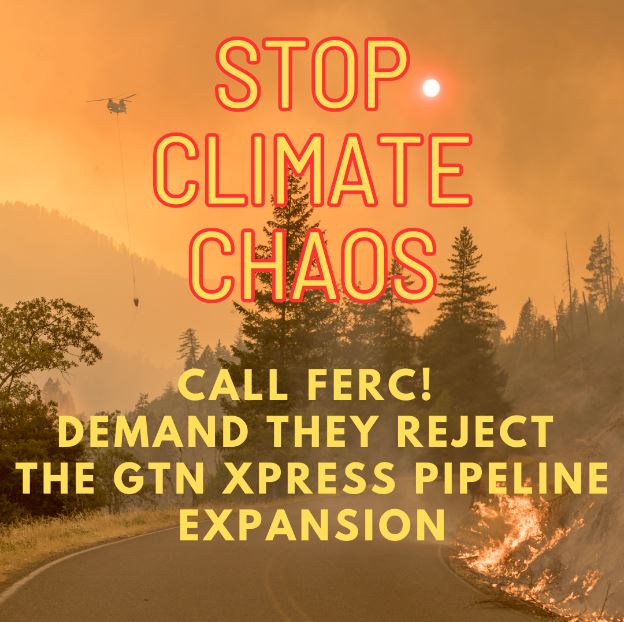 WHAT THE FERC?!
WHAT THE FERC?!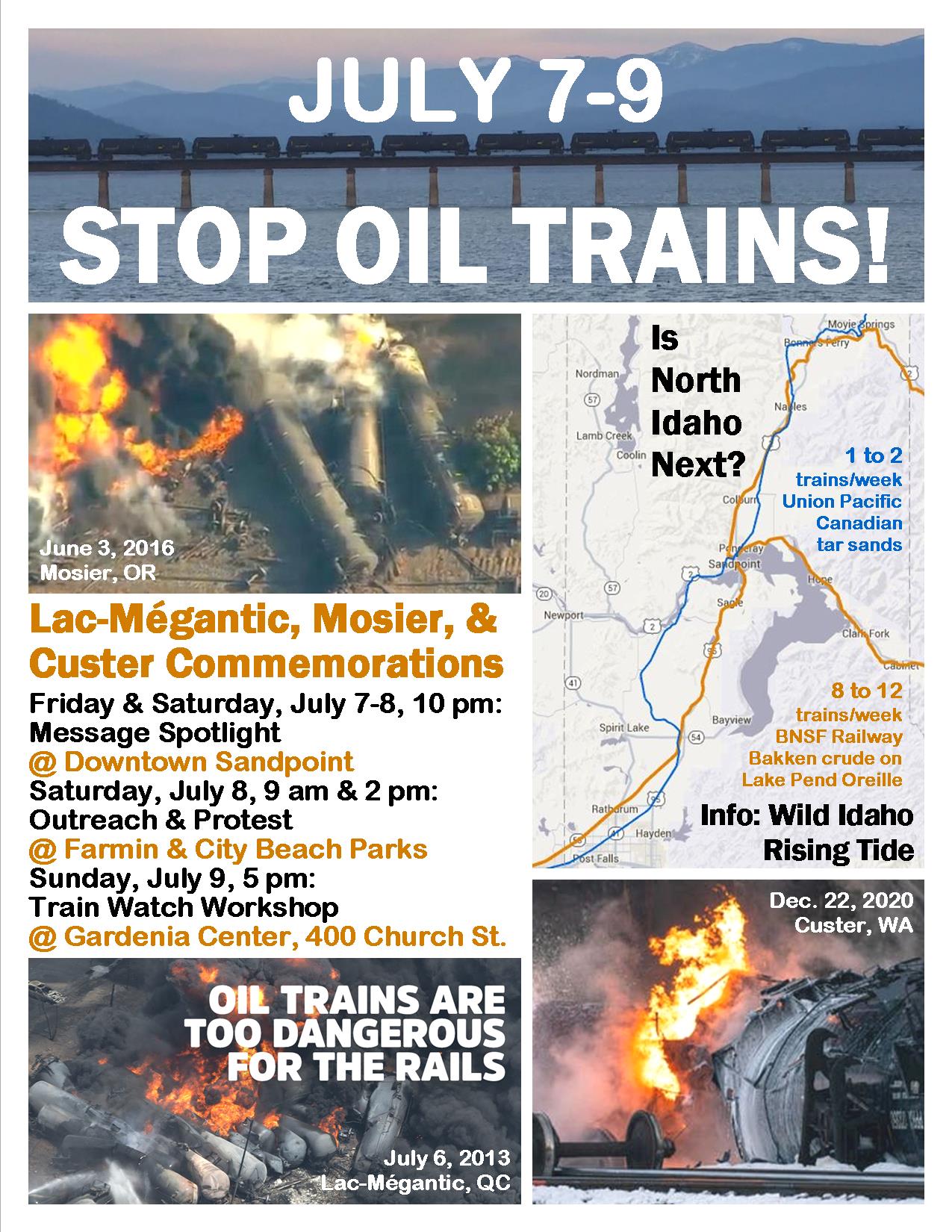 July 7-9 annual actions remember the Lac-Mégantic, Mosier, & Custer disasters
July 7-9 annual actions remember the Lac-Mégantic, Mosier, & Custer disasters
 On Wednesday evening, April 12, in Spokane, Washington, faith, spiritual, health, and environmental advocates will lead a community gathering, teach-in, and procession in opposition to the proposed Gas Transmission Northwest (GTN) Xpress fracked gas pipeline expansion [1]. The 62-year-old GTN pipeline runs under the Spokane River and through Liberty Lake, Spokane Valley, and other parts of Spokane County [2, 3]. Canadian company TC Energy, owner of the leaking Keystone and rejected Keystone XL tar sands pipelines, and its subsidiary GTN threaten to pump up to 150 million cubic feet of additional methane gas per day through the GTN pipeline that crosses north Idaho, eastern Washington, and central Oregon.
On Wednesday evening, April 12, in Spokane, Washington, faith, spiritual, health, and environmental advocates will lead a community gathering, teach-in, and procession in opposition to the proposed Gas Transmission Northwest (GTN) Xpress fracked gas pipeline expansion [1]. The 62-year-old GTN pipeline runs under the Spokane River and through Liberty Lake, Spokane Valley, and other parts of Spokane County [2, 3]. Canadian company TC Energy, owner of the leaking Keystone and rejected Keystone XL tar sands pipelines, and its subsidiary GTN threaten to pump up to 150 million cubic feet of additional methane gas per day through the GTN pipeline that crosses north Idaho, eastern Washington, and central Oregon.